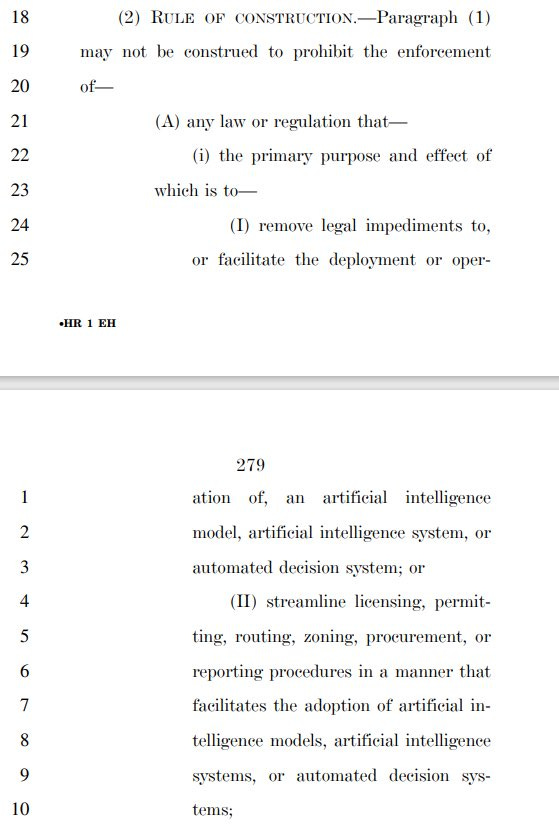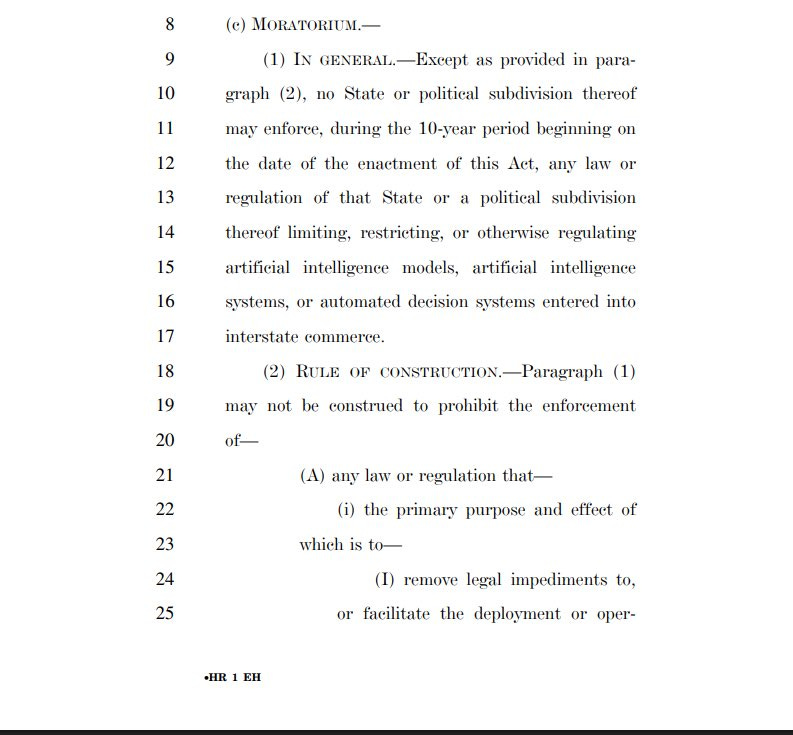The “One Big Beautiful Bill” and Its Controversial AI Provisions
The “One Big Beautiful Bill Act” (H.R. 1), specifically Section 43201 titled the “Artificial Intelligence and Information Technology Modernization Initiative,” includes a 10-year moratorium prohibiting states from enforcing laws or regulations governing “artificial intelligence models, artificial intelligence systems, or automated decision systems.” However, the bill outlines specific exemptions that allow certain state laws to remain in effect or be enacted despite the moratorium. Below is a clear explanation of these exemptions and their implications.
State Exemptions Explained
The moratorium on state AI regulations includes three key exemptions, which permit states to enact or maintain laws under specific conditions:
1. Laws That Remove Legal Barriers to AI Deployment or Adoption:
• States can pass or enforce laws that facilitate the development, deployment, or adoption of AI technologies. For example, a state could implement policies that streamline permitting processes for AI research facilities or provide tax incentives for AI startups.
• Implication: This exemption encourages states to promote AI innovation but does not allow them to impose restrictions or regulations that limit AI use, such as safety or ethical guidelines.
2. Laws That Apply Generally to Non-AI Systems:
• States may enforce laws that apply broadly to technologies performing functions similar to AI systems, as long as these laws do not specifically target AI or impose AI-specific requirements. For instance, a state law regulating data privacy for all software systems (including AI) could remain valid if it doesn’t single out AI technologies.
• Implication: This allows states to maintain general consumer protection or technology laws but prevents them from crafting AI-specific regulations, limiting their ability to address unique AI-related risks like algorithmic bias or deepfakes.
3. Reasonable, Cost-Based Fees or Bonds:
• States can impose fees or bonding requirements related to AI systems, provided these are “reasonable” and treat AI and non-AI systems equally. For example, a state could require a licensing fee for businesses using automated decision-making tools, as long as the fee applies equally to AI and non-AI technologies.
• Implication: This exemption permits minimal financial oversight but restricts states from using fees or bonds to regulate AI behavior or outcomes, such as mandating transparency or accountability measures.
Why These Exemptions Matter
While these exemptions provide some flexibility, critics argue they are narrow and insufficient to address critical AI-related concerns. For example:
• They do not allow states to regulate pressing issues like AI-driven discrimination in hiring, deepfake misuse, or addictive AI chatbots, which have been focal points of state legislation (e.g., over 60 state AI laws, per the National Conference of State Legislatures).
• The requirement for equal treatment of AI and non-AI systems limits states’ ability to tackle AI-specific challenges, as AI technologies often pose unique risks due to their complexity and autonomy.
• The focus on removing barriers and maintaining neutrality favors AI adoption over consumer protection, potentially leaving gaps in oversight during the 10-year moratorium, especially since no comprehensive federal AI regulations currently exist.
Context and Debate
Supporters of the exemptions, such as tech industry advocates, argue they prevent a “patchwork” of state regulations, fostering innovation and uniformity. Critics, including consumer advocacy groups and state lawmakers, contend that the exemptions are too restrictive, undermining states’ ability to protect citizens from AI harms. Public sentiment, as seen on X, reflects concern that the moratorium prioritizes corporate interests, with some calling it a “disaster” for consumer rights.
The state exemptions in the OBBBA’s AI provisions allow limited state authority to promote AI adoption or apply broad, non-AI-specific laws, but they block targeted AI regulations for a decade. This centralizes AI governance federally, raising concerns about consumer protections and state autonomy as the bill heads to the Senate.



